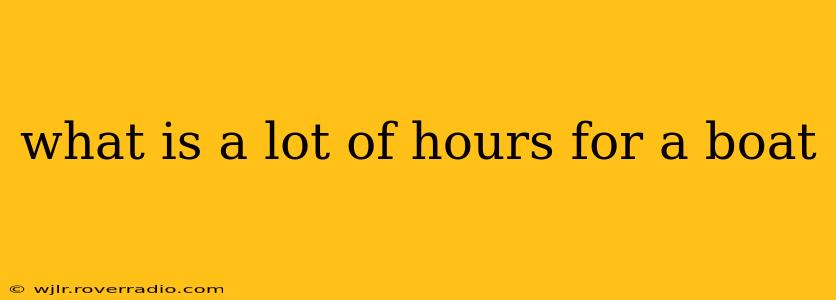What is a Lot of Hours for a Boat? Understanding Boat Engine Hours
Determining what constitutes "a lot" of hours for a boat engine is tricky and depends heavily on several factors. There's no magic number. Instead, it's more about understanding the context and comparing to similar boats and engines. Think of it like car mileage – a high-mileage car isn't automatically bad, but it needs more attention. The same applies to boats.
Here's a breakdown of what to consider:
What Type of Boat is It?
The type of boat significantly impacts engine hour expectations. A small fishing boat used frequently in calm waters will accumulate hours faster than a large, luxury yacht used sparingly for leisurely cruises. Heavy-duty commercial vessels might accumulate thousands of hours annually, while a recreational sailboat might see only a few hundred.
How Old is the Boat?
An older boat with 500 hours might be considered high-mileage, while a newer boat with the same hours could be perfectly fine. The age of the engine and its maintenance history significantly affects its lifespan and expected operating hours.
What Kind of Engine is It?
Different engine types have varying lifespans. Inboard engines, outboard engines, and stern-drive engines all have different characteristics impacting their longevity. Some engines are simply built to last longer than others. Researching the expected lifespan of the specific engine model is crucial.
How Well Maintained is the Engine?
This is arguably the most critical factor. Regular maintenance, including oil changes, filter replacements, and inspections, dramatically extends an engine's lifespan. A meticulously maintained engine with 1000 hours could be in better shape than a neglected engine with only 500 hours.
What Kind of Use is the Boat Subjected To?
Operating conditions significantly affect wear and tear. Engines operating under constant high load (e.g., towing heavy loads or navigating rough seas) age faster than those used for leisurely cruising in calm waters. Saltwater use is particularly harsh and accelerates corrosion.
What are the Common Indicators of High Hours?
Several signs might indicate that a boat has accumulated excessive hours:
- Decreased performance: Noticeably reduced speed, sluggish acceleration, or difficulty planing.
- Increased fuel consumption: Higher-than-usual fuel consumption suggests internal engine wear.
- Unusual noises: Unusual knocking, rattling, or squealing sounds are warning signs.
- Excessive vibrations: Increased vibrations indicate potential engine imbalances or wear.
- Leaks: Oil leaks or coolant leaks point to significant engine issues.
Is 500 Hours a Lot for a Boat Engine?
500 hours isn't necessarily excessive, depending on the factors mentioned above. For some boats, it could represent several years of moderate use, while for others, it might signify intensive use in a shorter period. The key is to assess the engine's condition, maintenance history, and type.
How Many Hours Should You Expect From a Boat Engine?
There's no single answer. Some engines might comfortably reach 2000 hours or more with proper care, while others might show signs of significant wear at 1000 hours. Consult your engine's manual for manufacturer recommendations and research the typical lifespan of similar engines.
In conclusion: The "lot of hours" question is subjective and requires careful consideration of the boat's type, engine's age, maintenance history, usage, and overall condition. Focus on the overall health and maintenance record rather than simply the number of hours.
